LAUGHING TORSO 
Henri had already gone to France and Basil was
trying to get into the Army. He finally persuaded
He finally persuaded
a grand relation to use her influence and he got a
commission in a Scottish regiment and appeared
looking very magnificent in a kilt. He was very
sorry that I had got married, and so was I. We
went out and drank some drinks together and talked
about the hopelessness of the future. He went to the
War a few days later and was killed in Mesopotamia
in 1915.

Edgar and I met many interesting people at the
Omega. There were many Belgian refugees, musi
cians, and actors, and Madame Vandervclde, who
was very good to them all and acted and recited in
order to raise funds to help them. She also bought
some of our pictures. Edgar decorated her flat for
her and so we managed to live. She was a very
brilliant and amusing woman and had extremely
good taste in Art. Edgar suggested to Mr, Fry that

they should have a musical performance of De
bussy's " Boite a Joujoux" and that he should make
and work the marionettes for it. This he did. We
all worked the marionettes. We lay on our stomachs
and pulled the wires. He cut them out of card
board with a knife. We had a fine orchestra of
Belgians and a good audience and they made some
money. 
After the arrival of the Belgians, Charlotte Street
became very gay. There were Bal Musettes all up
the street. A big Belgian played an accordion and
everyone danced and a hat was taken round after
for halfpennies, as they do in France and Belgium
in workpeople's dances. We worked at the Omega
for so many hours a day and often had lunch with
Roger Fry, who had a room in Fitzroy Street, where
he painted.
He did several paintings of me, one of
which was at his last show in Bond Street .
.
Vanessa
Bell and Duncan Grant worked sometimes at the
Omega Workshops. She was very beautiful and had
a wonderful deep voice. I used to go home and
attempt to lower my voice too. I think I succeeded
to a certain extent after some practice. They
painted batiks and boxes and turned out some fine
work. I was never very good at decorative work.
I met Edward Carpenter one day at lunch at Mr.
one day at lunch at Mr.
Fry's. He was a saintly old gentleman with a grey
beard and a grey shirt. Walter, now Richard,
Sickert lived in Fitzroy Street also, in fact he had
a number of mysterious rooms for miles around as
far as Camden Town.(Why?Sickert did not return to London
until February 1905 when
he acquired his studios in ...
"He revelled in the faded splendours of dingy lodging-rooms
in Camden Town. .... Like so many of Sickert's titles,
it has never been explained. .... the
fact that some of the portraits of Mrs Barrett
seem to have started out with different titles.
Stage scenes were also one of Degas' favorite subjects, but whereas his
work had considerable erotic quality,
Sickert's paintings were often
full of undefined psychological tensions.
Attitudes towards sexuality in
Victorian England were far from liberal;
and Sickert was secretive in
many ways about his personal life.
His nudes, painted without apparent
sexual interest, were lower class
women in cheap rooms. "Compositions
consisting solely of nudes are usually
(I have not forgotten certain
exceptional flights of genius, such as
the Rubens, in Munich, of the Descent into Hell)
not only repellent," Sickert said
in 1910, "but slightly absurd. Even
the picture or two (I think there are two)
of the master Ingres, which
is a conglomeration of nudes,
has something absurd and repellent, a
suggestion of a dish of macaroni,
something wriggling and distasteful."
The name of one of his paintings,
La Hollandaise (1905-06), was probably
derived from one of Balzac's characters
in Gobseck, a prostitute nicknamed "la belle Hollandaise."
Sickert could also be outspoken with his views When the aspiring artist Nina Hamnett
showed her pictures to him,
Sickert was horrified and hated them. "I rather admired them myself at
that time," she wrote later, "but, having seen some of them recently, am
inclined to think that he was right." )
Edgar and I sat for him
together, on an iron bedstead, with a tea-pot and a
white basin on a table in front of us. We looked the
picture of gloom. 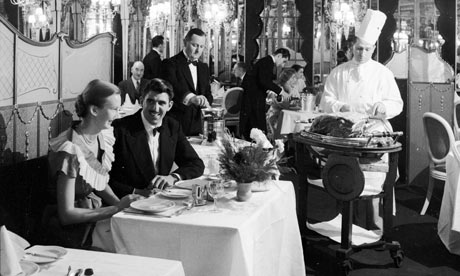
We went every evening to the Cafe Royal and
frequently walked home to Camden Town as we
seldom had the 'bus fare. We could stay the whole
evening there on a fourpenny coffee in those days.

Edgar had made friends with some people whom I
considered dull, common, and boring, so he often
went out with them and I stayed at home. He
seemed to think that I should always be at home
waiting for him and once, when I went out to 
dinner with an elderly man I had known for years,
an awful argument took place and we threw sauce
pans at each other. I got so bored with this and
being so poor, as there was not always work at the
Omega, that I fell in love with a tall dark man
whom I had met at the Cafe RoyaL He talked
about Greek Islands and black olives. He was a
writer and had studied the piano and had most
beautiful hands. He talked and talked about
things which I did not understand at all. For three
weeks I thought of nothing else but him, and would
even walk up and down streets in which I thought
I might get a glimpse of him. I would buy myself
dinners at the " Sceptre," the restaurant behind the
Cafe Royal, where I had gone with Henri. The tall
man seemed rather amused at me. After about
three weeks of thinking about him I saw him at the
restaurant. He was alone, and asked me to have
some coffee with him. 
My heart beat so rapidly
that I shook all over. He told me that he was en
gaged to be married and I, with a choking feeling in
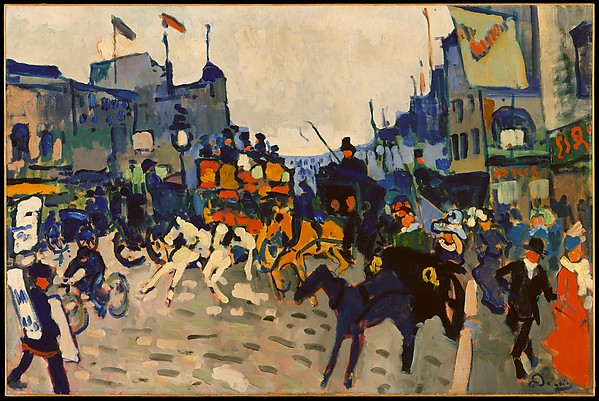
my throat, said that I would like to meet his fiance.
I went home and cried a good deal and a few days
later met her. The passion immediately died, and
she and I became great friends and I painted several
portraits of her. It was trying, many years later,
after he and his wife had parted and he was quite
alone, when we had some drinks together in Paris
and I told him of the great passion that I had had.
He was very much surprised and said, seizing my
hand, " Don't you think those things could ever be
revived/' and I said, " I am afraid they couldn't/'
and he was very sad. However we are still friendly
and he has become a very celebrated man and is
now happily married. 
I was getting more and more bored with Edgar
who was daily becoming more soulful, and spoke in
parables which I had long since given up at
tempting to understand. He bought some wooden
blocks and did some woodcuts. These were very'
interesting and he sold a few. The painter, Ben
jamin Corea, lived in an attic in the next house.
He was even poorer than we were. I would buy
two pennyworth of bones twice a week and make a
stew, and on this and porridge and margarine, we
all three lived. One day someone bought a drawing
so I bought some real butter. Edgar and I had a
dispute about people with Victorian ideas, which
I said he had, and he threw the plate and the butter
at me. I was so upset about the butter that I forgot
to throw anything back. I looked despairingly
round and saw it sticking to the wall. It was still,
fortunately, quite eatable. One day a rich aunt

appeared to see how we were getting on. She advised
me to try a certain brand of margarine which cost
ninepence. I said I only paid fivepence-halfpenny.
She did not however leave the extra threepence-
halfpenny behind. Soon after this my uncle, her
husband, paid our rent, so that was a help. I am
afraid that sometimes when we were very poor I
spent the money on food and got into debt with the
landlord. 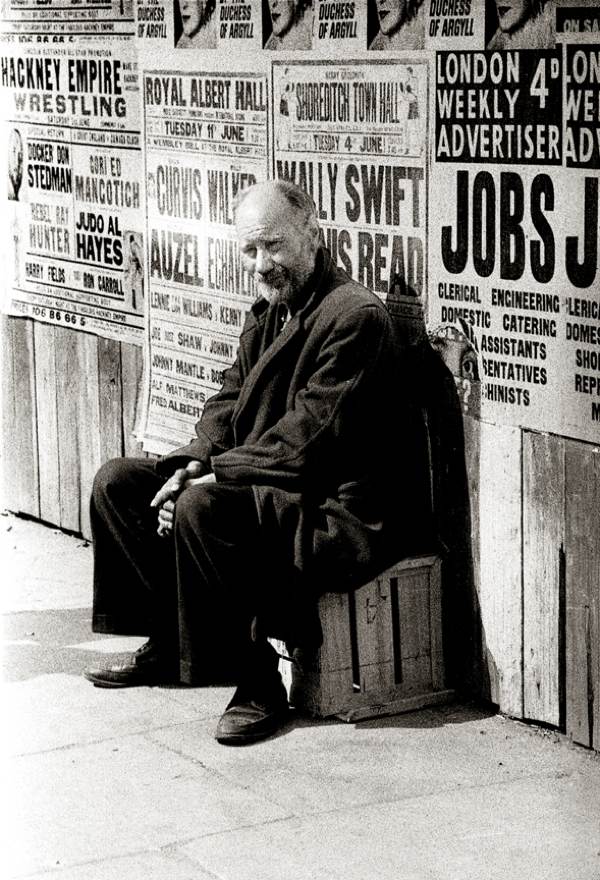 They were working-class people and,
They were working-class people and,
unlike many that I know, perfect beasts. We were
naturally regarded with the greatest suspicion,
having a German name. 
I urged Edgar to go to the police and register
himself. Everything was so unsettled that I think
they had forgotten about him for the time being.
One day a District Visitor appeared and asked
him what religion he belonged to. He said that he
was a " Hedonist, 5 ' so she went away. We met the
painter, Foujita, one of Les Japonais in Paris; he
was delighted to see us as he was just as poor as we
were. He only became famous in Paris after the
War. He still made his own clothes and wore his
hair the same way, but without the Greek band.
He wore strangely shaped baggy trousers and a black
velvet jumper, which hung outside, and a leather
belt. People called him the " Eskimo
He
lived with some friends in Chelsea and did charm
ing frescoes in their kitchen of antelopes and
flowers. Someone afterwards took the house and
said that they did not care for other people's
decorations, and had them whitewashed, I think
they are now sorry. 
WAR
On Sundays, Foujita, Edgar, and I, went home
to my parents for lunch; this was frequently the
only decent meal we had during the week. My
Father became quite human, and in the afternoons
we all played " heads, bodies, and legs." That is the
game where everyone draws a head and leaves two
lines indicating where the next person should begin
the body. The pieces of paper were then passed to
the next person and then again until the legs were
done. The drawings were very funny and some of
them very good. 
Foujita was a charming character and had the
most terrible ' struggles before he became famous.
I last saw him when I stepped off a boat on the
He de Brehat, in Brittany. I had not seen him for
three or four years. He was sitting on the terrasse
of a cafe. His hair had turned very grey. He had
large gold earrings on and wore red horn-rimmed
spectacles. He was with his wife, who was very
chic and beautifully made up. There was another
Japanese with them. I waved to him and he said
" Bonjourninahamnett" as if he had only seen me the
day before. We sat down and talked about the old
days. I was sorry that I had to go back to Paimpol
that day, where I was staying opposite, as I believe
they had wonderful parties every day with bathing,
singing, and drinking. 
One day I went to dinner with a woman friend
of mine in Clifford's Inn. We had dinner and some
wine, and suddenly there was a strange whizzing
sound and she said, rather nervously, " What is
that? " I said, " That is only a motor-'bus." She
85 
LAUGHING TORSO
said, cc Have another cigarette and some port/ 5
which I did. There was a terrific crash and we
both went outside and in the sky was a thing that
looked like a golden pencil. This was the first
Zeppelin. We then heard several other crashes
fairly near, but getting further away. I had to
catch a 68 'bus to get to Chalk Farm. When I got
to Chancery Lane it was about six inches deep in
water. A bomb had hit a water main and a gas
main, and the water was rushing down the street.
I was annoyed as I had a pair of new shoes on and
got them wet. The Strand was several inches deep
in broken glass, as nearly all the windows had been
broken. When I got to Wellington Street a huge
green flame sprung up opposite the Gaiety Theatre.
I thought that another bomb had dropped and sat
down in the doorstep of a bank, thinking that death
was rapidly approaching. 
I thought of my wicked life, and of my Father and
my Grandmother, with a certain sentimental regret.
As nothing happened I got up and thought that I
would go to the Cafe Royal. The people in the 'bus
that I should have taken, if I had not had another
cigarette and a drink, were sitting in the 3 bus with
their heads blown off, as a bomb had dropped out
side. I took a 'bus to the Caf<5 Royal by the Savoy
Hotel. In it were two Japanese. The evening
cloak of one was torn to bits. He had been inside
the Gaiety Theatre, but fortunately, his cloak had
been hanging up in the cloak room. We all talked
together of what had happened. In Paris in 1920
I met him. I said, " I have met you in London,"
86 
WAR
He did not remember me but did when I reminded
him of the air raid. The cafe was in an uproar and
everyone drank to celebrate their escape.  Edgar
Edgar
and I saw the daylight air raid from our attic
windows. It was a fine sight, and they were in
wonderful formation, like a flock of birds surrounded
by the little white puffs of smoke of the British guns.

One day I became so ill that I went home to my
Father and Mother, who, although they disapproved
of me, still liked to see me. My family lived at
My family lived at
Acton and during the night I had a dream. I
dreamt of noises which tapped and tapped. Sud
denly I woke up and looked out of the window. I
saw what I thought were fireworks, a big golden pen
cil diving to the earth. 
I came into my Father and
Mother's room and said, " Please wake up, I think
there must be a Zeppelin falling down." My
Father said, cc Go to sleep and don't disturb me."
I said, " You must wake up and come into the
garden," and he did and we saw it break in half
and come down in a rain of golden showers. This
was the Cuffley Zeppelin. 
We visited the poetess, Anna Wickham, some
some
times. She lived in a beautiful old house in Hamp-
stead. It had an apple orchard and Dick Turpin
had lived there once. There we met Richard
Richard
Aldington and his wife. They were Imagist poets.
Richard had known Henri very well and had some
of his work.
In 1913, when I first met Anna Wickham, I had
influenza very badly. I was living alone and did
not want to go home to my family. She was kind
enough to invite me to her house and to look after
me.
I stayed in bed and had a room overlooking
the garden. 
Several times a week D. H. Lawrence,
his wife, and Katharine Mansfield came to see Anna.
Mrs. Lawrence and Katharine sat by my bedside
and talked to me. D. H. Lawrence sang hymns for
hours in the drawing-room. This was not awfully
cheerful. I had never seen him and was told not to
get out of bed on any account as my temperature
was nearly a hundred and four. One day I heard
voices in the garden. I heard Anna and a man's
voice and got out of bed and saw a man with
reddish hair walking amongst the apple trees,
talking to Anna. That was the only time I ever saw
Lawrence and never met him at all. 
above jesse chambers.
The Cafe Royal and other places closed early
during the War and we found an Armenian cafe at
the back of Shaftesbury Avenue. There everyone
went. Epstein, Michael Arlcn,
John Cournos above right , in
fact every inhabitant of the cafe. We drank
Turkish coffee  and ate Turkish delight
and ate Turkish delight and I think
and I think
that the conversation, as the result of the Turkish
coffee, was better than that; of the crime de menthe
frappfe. There was an old man who spoke on soap
boxes in Hyde Park who went there one day; he
decided to take to painting. He used to buy old
oil paintings from the Caledonian market and other
places and touch them up and exhibit them in the
Armenian cafe. He had a one-man show there.
He also painted spirits. One day I saw him in
Charlotte Street. He had a costermonger's barrow
with him and it was loaded with the tops of old 
hansom cabs. I said to him, " My dear Arthur,
what are you going to do with these? " He said,
" You see, dear, I think they will be so useful to
paint on."
He was reputed to have been found in the cellar,
in which he lived, in bed with a policewoman; and
her helmet and baton were hanging by a nail on
the wall as a souvenir. 
I saw him last in the Fitzroy Tavern. He came
in looking just the same this was about ten years
later his beard had grown nearly white; he had
a sack on his back, and his coat was still fastened
with safety pins. He bought a large jug of beer and
filled everyone's glass. I hear that he is now respect
ably married.
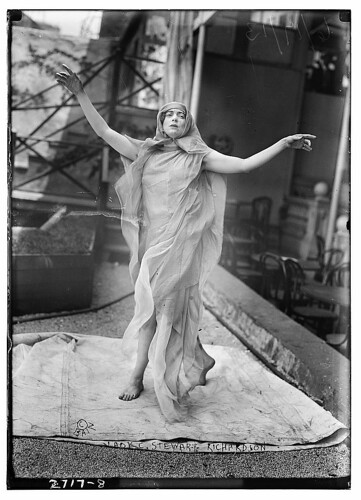
One day someone took me to the studio of Lady
Constance Stuart Richardson.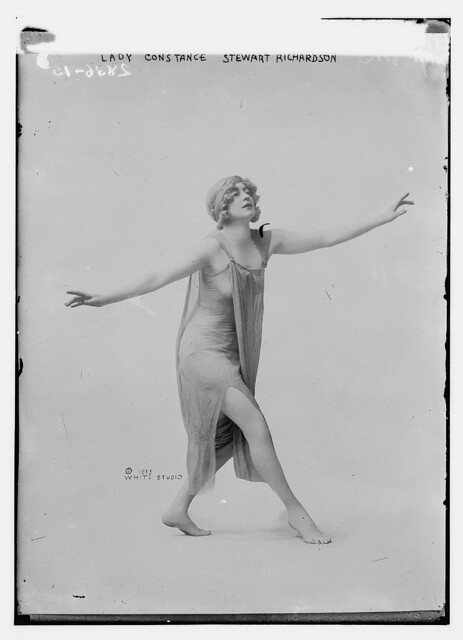 She lived in an old
She lived in an old
Criminal Law Court near Sloane Square. There
was a party and everyone brought bottles.
It was a huge place with many rooms. I stayed
the night there in a large Greek bedstead. Several
other people stayed in different places and we had
breakfast in the morning. The others had to go to
work at various offices, and Constance and I sat in
front of the fire and talked and got on very well
indeed. I had known a cousin of hers who had been
killed. She was a most charming and interesting
woman and my dreary existence was cheered up by
her company. As Edgar neglected me a good deal
I spent most of my time with her. She had a
marvellous figure and danced with not much more
on than a tiger skin before the War, and even then

this was considered most shocking, and when she
appeared at the Palace Theatre there was a terrible
disturbance.
Neither of us had any money or, at least, very
little and we ate often at a little restaurant in Soho
where we got credit. We had often with us officers
of all nationalities. Italians in blue cloaks, French
men, Guardsmen, and so we did not always have to
" Chalk it up." I painted a portrait of Constance.
She had a black turban on and a red robe, rather
like a burnous that the Arabs wear. It was a good
painting and was bought by Sir Michael Sadler.
I sent it to the National Portrait Society and it was
accepted. On the day of the private view, Con
stance and I went. The place was full of all kinds
of grand people. They all flocked to my portrait,
expecting to see an almost nude woman. They
were bitterly disappointed, and Constance and I
laughed.

There were parties nearly every night, as all the
time officers were returning on leave for a few days.
This, I think, was the beginning of" gate crashing."
Someone would arrive and say, " Let's have a party
to-night, collect your friends and tell them to bring
anyone they can," and, of course, they did. One
week we went to five all-night parties and did not
go to bed at all. The first one was in Chelsea,
given by an artist who wore a Russian shirt and
played the accordion, Constance and I went and
brought two Italian officers with us who were much
admired in their blue cloaks. The party was such
a success that Constance decided to give one the
 following night. That was a terrific affair. Some
following night. That was a terrific affair. Some
of our friends had gone to the Ritz and the Berkeley
to see if they could find any more people to bring,
and they came back with a glorious creature in a
blue and gold uniform, covered in medals. They
said, " look what we have found. He was a
French Count. He had a very small motor, which he
called Le Lapin, and which he drove at terrific speed.
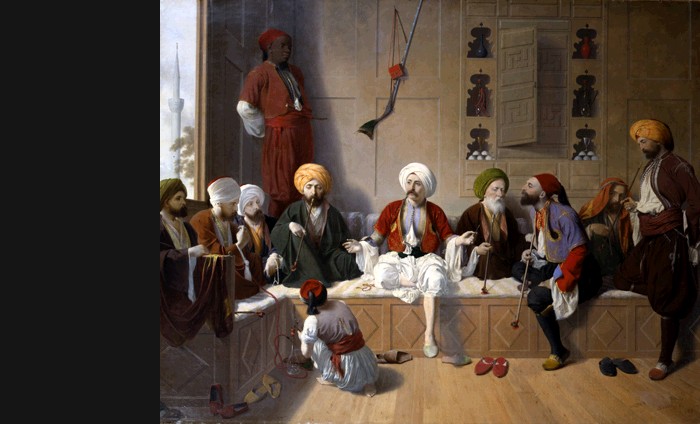
The third night Augustus John gave a party to
celebrate his going to France. He was a major in
the Canadian Army and was commissioned by them
to paint their part in the War. The party lasted all
night and in the morning we hung out of all the
windows and waved him " Good-bye He looked
splendid in his uniform.
A beautiful woman, who was the wife of a Guards
man, gave the parties on the two following nights.
Billie Carlton( Although she she was well on the way to becoming a star her career was
being held back by, what was becoming a rather obvious and large drug
habit, and unfortunately the girl with too much charm and the daring
costume was found dead in her Savoy Hotel suite by her maid the morning
after the Victory ball. She was just 22 years old.Witnesses described her heavy cocaine and opium use and it became known
that the London-born actress, who incidentally never knew her father,
was involved with three ‘sugar daddies’. Two of these helped her
financially – she had a very expensive life-style to maintain including a
permanent suite at the Savoy Hotel – while the other, a married
dress-designer called Reggie de Veulle, was more of a drug-taking
partner.)
was there and all kinds of actresses 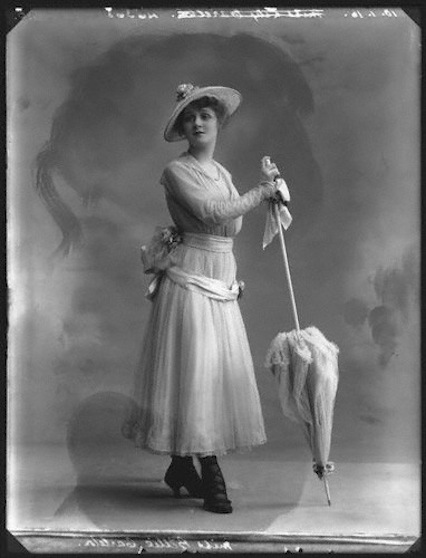
and Guardsmen and foreign officers in uniform.
Edgar came too. He made a scene because some
one put his arm round me as I was walking up
stairs to the ball room. I burst into tears and
everyone took my part and I told him to go home.
I stayed the night there with Carrington, the girl
with the red and blue shoe, and another girl.
One morning two plain-clothes detectives came.
They were drunk and smelt of whisky. They wanted
to know why Edgar had not registered himself. I
said that I had frequently told him to do so. They
said that he had better hurry up as there would be
trouble. They were very unpleasant and familiar
and made me feel quite ill. Edgar still refused to do
anything. He used to stay with his friends in
Chelsea for nights at a time. I never went to their
house except once to a party. One day the police
came there and arrested him in the kitchen for
being an unregistered alien. My reputation amongst
these friends of his was that I was a wicked woman
who was ruining his bright young life and cramp
ing his brilliant career. He did not come home
that night. I did not worry as he never told me
when he was returning.
Early in the morning the police came and told
me that he was in a Police Court at Marylebone.
I went to see him and the trial came on later. I
did not go to it but his friends did. Later that
morning when I was working at the Omega two
young women came there, and with tears in their
eyes told me that he had got three months' hard
labour for not registering* I said " Oh! " and felt a
sense of freedom at last. This sentence was passed
under the Aliens' Act, which was enforced during
the War.
I went to my attic and wondered how Edgar was
feeling, I went to see him once; that was the only
time I could. I think he rather enjoyed prison
life. He had books to read and as he was of a

ruminative disposition he was quite happy.
I was now able to go out and see my old friends*
I sold drawings and paintings and was able to work
in peace and began to be very bored with the attics
in Camden Town, I made friends with a charming
girl, Marie Beerbohm,
She had been a friend of
Edgar's and for that reason I hardly knew her.
We became great friends and I had a very good
time.
Towards the end of Edgar's three months I
wondered what would happen as I was very happy
by myself and was very much disinclined to have
him back. I knew I would have to. I asked the
police and they said that he would not be allowed
to stay in England but would be sent to France in
the Belgian Army. I went to fetch him from the
prison and, accompanied by detectives, took him to
a camp, where he remained till he was taken to
France,
He seemed pleased to see me and sorry
to go. I felt sentimental about the past and we
both wept as we said good-bye at Waterloo. I have
never seen him since. He wrote to me from France,
and the last letter I had was just after the Armistice,
when he asked me to send him five pounds, saying
that he loved me as much as ever. I did not reply.
Having made a little money and still having work

This scarf is inspired by designs from The Omega Workshops, founded by
the artist and critic Roger Fry in 1913. Although the company only
operated for six years, it was a powerhouse of radical designs from many
of the most avant-garde artists of the day including Vanessa Bell,
Duncan Grant, Wyndham Lewis, Frederick Etchells, Henri Gaudier-Brzeska
and Winifred Gill.
The Workshops created a range of objects for
the home from rugs and clothes to ceramics and furniture, all boldly
coloured and patterned with dynamic abstract designs, which still look
fresh and modern today.
at the Omega I decided to look for a studio in the
neighbourhood of
Fitzroy Square. I found one on
a top floor in Fitzroy Street. It was quite large
It was quite large
and had a bedroom and kitchen. I believe that
at one time Augustus John had lived there, and later
on Percy Wyndharn Lewis. Walter Sickert lived
opposite, that is to say he had a studio there, but he
actually lived in Camden Town. I was happier
there than I had been for three years. I heard that

Sophie Gaudier Brzeska was living in Fulham and
went to see her. She showed me a photograph of
Henri at the Front. 
She was taking a cottage in
Gloucestershire and asked me to stay with her.
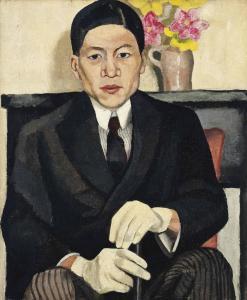 khori by hamnett
khori by hamnett
93
He finally persuaded
.
one day at lunch at Mr.

They were working-class people and,

Edgar
My family lived at

some
Richard



and ate Turkish delight
and I think

She lived in an old

following night. That was a terrific affair. Some





It was quite large


khori by hamnett

























No comments:
Post a Comment